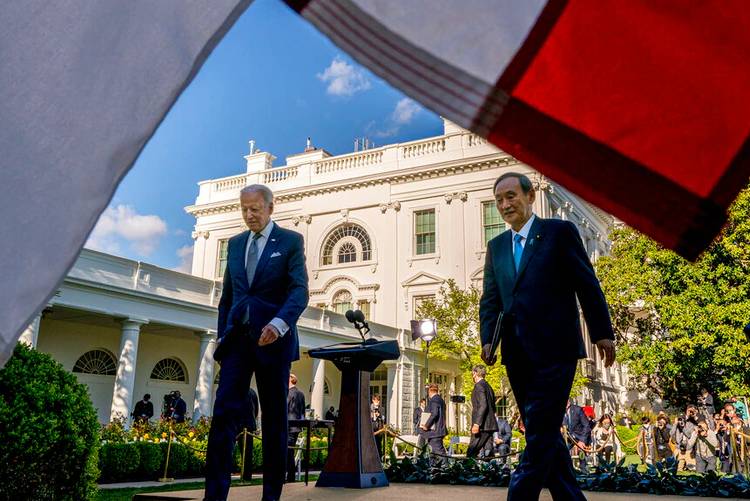U.S. President Joe Biden says he and Japanese Prime Minister Yoshihide Suga are committed to working together to counter challenges from China and North Korea, following Biden's first White House summit since taking office.
Biden told reporters after meeting with Suga during the one-day summit Friday that they affirmed their "ironclad support for the U.S.-Japanese alliance" and said they would work together to "take on the challenges from China and on issues like the East China Sea, the South China Sea, as well as North Korea."
The U.S. president called the discussions "very productive" and said the United States and Japan also agreed to work together to support global COVID-19 vaccination efforts as well as to promote new technological developments, including 5G networks, artificial intelligence, and quantum computing.
In a response to a reporter's question, Suga said the two leaders had discussed Taiwan and said they reaffirmed the importance of "peace and stability" in the Taiwan Strait. He said he would not give further details on the Taiwan discussion.
Suga said that he told Biden that he was committed to moving forward with the summer Olympic Games in Japan despite the coronavirus pandemic. Suga said that Biden offered his support.
Suga was the first foreign leader to hold face-to-face talks with Biden since the U.S. president assumed office in January.
Before the talks began Friday, Biden told reporters at the White House that he was "really pleased to welcome such a close ally, and good partner."
Suga said he was grateful for the meeting and reaffirmed the "new and tight bond" between Japan and the United States.
Since Biden took office, he has focused on reviving the alliance with Japan, as well as U.S. involvement in multilateral institutions, which were often criticized or shunned by former President Donald Trump.
The meeting underscored the importance of that alliance, particularly as their common rival, China, grows in strength and aggressiveness.
"We have to shore up American competitiveness to meet the stiff competition we're facing from an increasingly assertive China," Biden said earlier this week as he explained his decision to withdraw U.S. troops from Afghanistan.
Japan recently joined the U.S. and other democratic nations in calling out Beijing's human rights abuses and incursions into disputed areas of the East and South China seas, seen as a departure from a longstanding trade and economics-centered approach. China is Japan's largest trading partner.
Sheila Smith, a senior fellow at the Council on Foreign Relations, told VOA that the United States and Japan want to present a united front on China, but "both governments understand that this is a delicate moment in the relationship with China. They don't want to incite or provoke activities that they don't desire."
Japan's ambassador to the U.S., Koji Tomita, told VOA this week that Japan is "very encouraged" by Biden's active engagement in the Indo-Pacific region, citing last month's virtual Quad Summit, in which Biden hosted the leaders of Japan, Australia and India.
"The international order is being challenged in various ways, so we hope to continue having specific discussions on the ways that Japan and the U.S. can take initiative in realizing our shared vision," he added.
Before Suga's meeting with Biden, China's Foreign Affairs Ministry warned Japan against "being misled by some countries holding biased views against China."
Earlier this month, China also sent a naval strike group near Okinawa, where the U.S. has troops, a signal Beijing is prepared to counter the U.S.-Japan alliance.
Japan hosts approximately 55,000 U.S. troops. The two sides routinely describe their alliance as the "cornerstone" of peace and stability in Asia.
(VOA)

